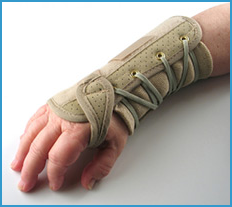Carpal Tunnel Syndrome
Carpal Tunnel Syndrome occurs when the median nerve that controls movement and sensation in the hand is squeezed or compressed as it passes through the carpal tunnel, a narrow passage in the wrist designed to protect the nerve. This pressure causes irritation of the nerve (also known as impingement or nerve entrapment) and can cause numbness, tingling, pain and weakness in the hand and fingers.
Causes of Carpal Tunnel Syndrome
This common condition most often affects people whose job requires repetitive use of their hands, and it is also more common in women. But despite common belief, carpal tunnel is not necessarily caused by overuse, but may be a result of a genetic predisposition. Some people naturally have a smaller carpal tunnel that is susceptible to irritation. Other cases may have no direct cause, or may occur as a result of arthritis, diabetes, obesity, pregnancy, menopause, injury or overuse. Any pressure placed on the median nerve can trigger symptoms.
Although most people associate carpal tunnel syndrome with pain and tingling in the fingers, it is important to note that this condition does not usually affect the small finger. If you are experiencing symptoms in this finger, you may be suffering from another condition.
Carpal Tunnel Symptoms
Carpal Tunnel usually begins as an ache in the wrist that may extend down to the forearm or up to the hand. As carpal tunnel develops, you may also experience tingling or numbness in the fingers or pain radiating through the entire arm. Some people may also experience weakness in the hand and arm, and may have difficulty grasping small objects. Carpal tunnel tingling and numbness are usually most severe when first waking up or when using your hands.
Carpal Tunnel Syndrome Treatment
Carpal tunnel syndrome can usually be treated through conservative methods that include one or more of the following:
- Resting the hands
- Applying cold packs
- Anti-inflammatory medication
- Corticosteroid injections
- Hand splints or wrist splints
- Carpal tunnel exercises
- Occupational therapy
- Carpal tunnel surgery
These treatments are usually effective in relieving symptoms. Carpal tunnel syndrome caused by other conditions can often be relieved by treating the underlying cause.
Carpal Tunnel Surgery
More severe cases of carpal tunnel syndrome may require surgery to relieve tingling and numbness. Carpal tunnel surgery involves making a small incision at the base of the palm which allows the surgeon access to the ligament. The ligament is cut, relieving pressure on the nerve. The gap in the ligament then fills with scar tissue as it heals.
Carpal tunnel surgery does not typically require a hospital stay; most patients go home the same day. Some patients experience relief right away while in some cases it takes more time. Most patients feel great relief in their symptoms after carpal tunnel surgery.
Typically non-surgical treatment is recommended for carpal tunnel syndrome. However, in the event that symptoms persist, there are severe symptoms or loss of function and/or there are signs of nerve damage, surgery may be considered. Additionally, Dr. Rehman may recommend surgery if there are signs of tumors or other growths.
Prevention of Carpal Tunnel Syndrome
Seeking medical attention for this condition is often the most important step in preventing the onset of symptoms. Since repetitive movement often triggers or increases symptoms, take frequent breaks if your job requires repetitive movement. Improving your posture to alleviate awkward hand positioning and keeping your hands warm can also help.
If you think you may be suffering from carpal tunnel, contact Dr. Rehman for a comprehensive evaluation and consultation. As with most medical conditions, early detection, awareness and a prevention or treatment plan is the most effective way to combat the effects of conditions like carpal tunnel syndrome.
Macomb County Carpal Tunnel Doctor: 586.532.0803

Hand Conditions We Treat:
· Carpal Tunnel Syndrome
· CMC and Thumb Arthritis
· DeQuervain’s Disease
· Dupuytrens Contracture
· Fingernail Infection
· Ganglion Cysts
· Hand, Wrist, Finger Fracture
· Hand, Wrist or Finger Pain
· Tendonitis
· Tendons and Nerves
· Tennis Elbow
· Trigger Finger
· Ulnar Nerve Neuropathy
· Dislocations
· Sprains and Strains
· Phalanx & Fingertip Injuries
· Crush Injuries
· Tissue Loss Amputations
· Extensor Tendons
· Flexor Tendons
· Scar Management
· Nerve Compression
· Joint Replacements
· Sports Injuries
· Replants
· Any Hand or Wrist Injury


